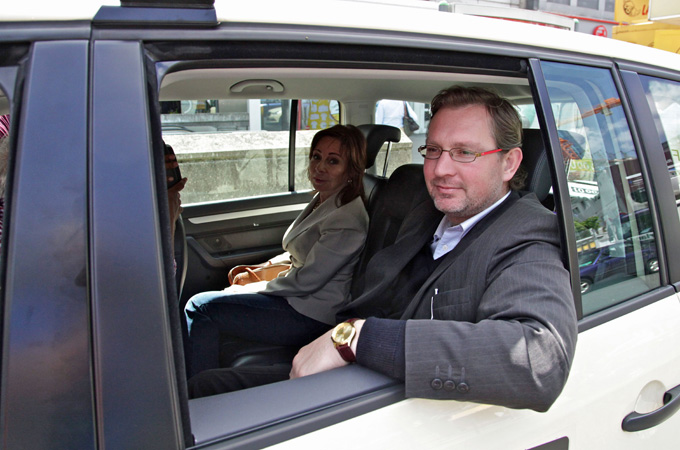
Lessons in torture
How did a German sect run by a former Nazi army nurse become an experimental torture centre for Chile’s Pinochet?
The foothills of Chile’s Andes Mountains have been home to a group of German residents for the past 50 years. This community is now known as Villa Baviera, but most still call it by its original name, Colonia Dignidad, or the Dignity Colony.
With rolling hills, rivers and forests, its facade is idyllic. But residents have revealed stories of child abuse, forced labour, torture and killings.
Winfried Hempel was born in the Colony. In the late 1950s, his parents met Paul Schaefer, a former Nazi army nurse turned Baptist preacher, and joined his flock.
“After World War II all Germany was in a situation of moral defeat and disorientation, people looked for a straw to grasp at …. They looked for preachers and so on and Schaefer was one of these figures who attracted people,” explains former Amnesty International employee Dieter Maier.
Schaefer began his career as a self-proclaimed preacher in a small northern German town, but when the mothers of two young boys accused him of abusing their children and the authorities issued an arrest warrant, he fled to Chile. Three-hundred of his followers joined him.
“Schaefer told his believers that communism, that the Russians where going to occupy Germany and that they had to leave before and they believed him,” says Dieter.
‘Attacker and saver’
By 1962, Schaefer and his group had established themselves as a charity in central Chile. They set up a farm, a bakery and even a state-subsidised hospital that offered free treatment to the local population, all with the blessing of the Chilean authorities.
“Schaefer wanted to reproduce a regime like the ones in the early biblical days … where everyone shared everything,” explains Winfried.
Families were split up and separated into groups by age and gender, with babies taken from their mothers at birth. All adults were known as uncle or aunt, while Schaefer was called eternal uncle.
Winfried did not learn who his parents were until he was 10. From the age of seven he was sent to work in the fields and says that “those who didn’t obey the rules were beaten, locked up, and [faced] other punishments”.
The community followed Schaefer’s every command.
“Schaefer had blood hounds, dogs, and he unleashed them, let them attack children and at the last moment he called them back so he was the attacker and the saver at the same time,” Dieter explains.
Werner Schmidtke was two when his mother brought him to the Colony. He was separated from her and raised with other young boys by a group aunt. One night, when he was about seven, he was told that Schaefer wanted to see him in his bedroom.
| The Colony – Extra |
Werner recalls what happened next: “He threw me on the bed, he spoke very softly to me, he caressed me like a father who loves his child. So I thought nothing odd …. Then something happened that shocked me. Why? Because he pulled my arm, he pulled me further down and finally I could feel something that he wanted that I did not want to do. He pulled me with force, and as a child I could not oppose.”
Chilean lawyer Hernan Fernandez says that the sexual abuse of children was a ritualised, well-organised practice: “[It was] a paedophile’s paradise with children that did not have the help or protection, because in Colonia Dignidad families did not exist, nor parents or anyone who could help them. Schaefer’s sexual abuse was brutal, he abused three or four different boys in the same day.”
When he would not submit willingly to Schaefer’s demands, Werner and some other boys were subjected to experiments.
“I heard a strong scream from another boy,” he recalls. “Then I found out why – it was my turn with electro shock. It was brought from Germany, that thing they use for prodding cattle. It was very strong. They shocked us in the soft parts of the body, in the head … and testicles.”
A state within a state
By the late 1960s, the Colony had become highly efficient at making money for Schaefer and his inner circle. The workers were allowed just one day of rest a year and were never paid for their labour, while Schaefer used the proceeds of their toil to fortify the enclave with barbed wire fences, watch towers, hidden bunkers, and concealed motion sensors and cameras, ensuring that escape was almost impossible.
It was, in effect, a state within a state, where the laws of Chile did not apply.
Schaefer carefully choreographed the image of the Colony so that, to visitors, it resembled a perfect slice of Germany in a foreign land. It was an impression he was keen to promote as he established links with the local police, judges and Chile’s powerful right-wing groups.
“Psychologically Schaefer was a genius,” explains Dieter. “He was mainly illiterate but psychologically he was really good at manipulating people. In order to keep a fanatic community together you need an enemy. For Schaefer this enemy was the devil … so anybody who criticised anything was a communist or inspired by the devil.”
Schaefer and his most trusted lieutenants crushed any dissent. Gudrun and Wolfgang Mueller were among the earliest settlers. When they protested against conditions in the Colony, they were force-fed drugs intended to treat epilepsy and schizophrenia.
“Whenever I spoke they would punish me with drugs, electro shocks and locking me up,” Gudrun remembers.
Schaefer was also in contact with some prominent Nazi fugitives living secretly in South America, among them the ‘Angel of Death’ Josef Mengele, who conducted experiments on prisoners at Auschwitz, and Walter Rauf, the inventor of the mobile gas chamber.
“It was an excellent refuge for receiving Nazis who were fugitives … because it was so sealed off,” explains Isaac Frenkel from the Chile Hebrew Association.
When, in September 1973, the democratically-elected government of socialist President Salvador Allende was overthrown in a coup led by General Augusto Pinochet, one of the darkest chapters in Chilean history began. Thousands were killed in a ruthless military crackdown.
Schaefer and Pinochet shared a hatred of communism and each found in the other something they needed: Schaefer required new political allies, while Pinochet’s agents, who were versed only in the most crude forms of torture, sought to learn more sophisticated interrogation methods. Colonia Dignidad became a torture and experimentation centre.
In 1975, Luis Peebles was a young medical student and a member of a militant left-wing movement. Picked up by the Chilean security agency, he was interrogated at Colonia Dignidad.
“The method of placing the electrodes was extraordinarily meticulous. They put electrodes all over my body – under my toe nails, my hands, my ankles, my genitals, inside my penis, my anus, my mouth, my nose,” he remembers.
Peebles was kept in an underground chamber at the Colony and was one of the few to get out alive. Scores of others simply disappeared. Dozens of bodies were later discovered in a mass grave.
The hunt for Schaefer
 |
| Winfried Hempel persuaded 120 former residents to file a lawsuit against the Chilean and German governments [Fadi Benni] |
With the community’s numbers dwindling, partly as a result of its low birth rate, Schaefer’s supply of young boys was running out. To counter this he opened the Colony up to the local population.
“Colonia Dignidad took advantage of the admiration that the Chileans in general had of German discipline and order, of beauty and cleanliness,” explains Fernandez. “That a Chilean child was received by the Germans was seen as an aspiration, almost a privilege.”
But, in 1995, one Chilean boy told his mother that Schaefer had raped him. Fearing his power and reach, she went 400km away to Santiago to report the crime.
With a new democratic government now in place, the Chilean authorities began actively investigating the conditions at Colonia Dignidad. Afraid that he would face criminal charges, Schaefer fled.
But his inner circle continued to assert its hold over the colony, and Winfried and a number of others, who were now of legal age, were sent away to prevent the authorities questioning them.
“It was incredible. I was standing on a street away from the colony, 20 years old with a psychological mentality of an eight-year-old boy,” recalls Winfried. “I was in front of an automatic door that opened by itself – something I had never seen in my life.”
In 2005, Hernan Fernandez and a Chilean journalist tracked Schaefer down to a small farm a few hours’ drive from the capital of neighbouring Argentina. Schaefer was extradited to Chile, charged with the sexual abuse of 25 minors and sentenced to 20 years in jail.
With Schaefer behind bars, the Chilean authorities began extensive investigations at Colonia Dignidad. In 2005, they discovered a stockpile of weapons. Then there were reports that chemical and biological weapons, including Sarin gas, had been produced at The Colony.
Some 28,000 files found inside the Colony are today kept under lock and key at police intelligence headquarters, leading many to ask what the Chilean state is hiding.
“There was an arsenal of chemical weapons which still exists,” says Fernandez.
Schaefer died in prison in 2010, leaving behind a legacy of shattered lives and unanswered questions.
From torture centre to tourist resort
Today, Villa Baviera’s gates are open. Now a tourist resort, it features a German restaurant and a hotel. But there is no memorial for those who endured years of torture there or for those killed and buried in mass graves.
There are some, however, who refuse to allow it to erase its past. Now a lawyer, Winfried persuaded 120 former members of the Colony to file a lawsuit against the governments of Chile and Germany.
During the early days of Colonia Dignidad, Schaefer enjoyed a close relationship with the German embassy, which even provided him with a diplomatic number plate, meaning that when escapees from the Colony sought refuge there, they were returned to Schaefer.
“One thing is to be victim of a crime and another is that the criminal commits the crime in full view of authorities who should be protecting the victims,” Winfried says. “[The state] played deaf, dumb and blind.”
”Having
obscene jokes.”]
In February 2013, five of Schaefer’s closest accomplices were imprisoned. But another, Hartmut Hopp, fled Chile before being sentenced, settling in the German city of Krefeld. The German constitution forbids a national from being extradited, so he lives there as a free man just a few kilometres away from Werner.
Some of Colonia Dignidad’s victims also returned to Krefeld, where they now live side-by-side with their former persecutors and even attend the same church. “Some of them stick together because they say ‘I forgive you’,” explains Dieter.
But the past still casts a dark shadow over many. Winfried is trying to establish a relationship with his parents and occasionally visits his father who still lives in the Colony.
“I’m not going to waste time with accusations because … regardless of a possible responsibility they may have had [for] following Schaefer, I know how hard it was for parents who tried to get close …. My father, for example, was publicly humiliated by Schaefer … because he came to see us more often than the other parents.”
The court will now decide if the claims of the 120 victims are valid. If so, it will be the first gesture of guilt on the part of the Chilean state. But while Chile is well on its way to coming to terms with its past, for the victims of Colonia Dignidad that process is just beginning.
